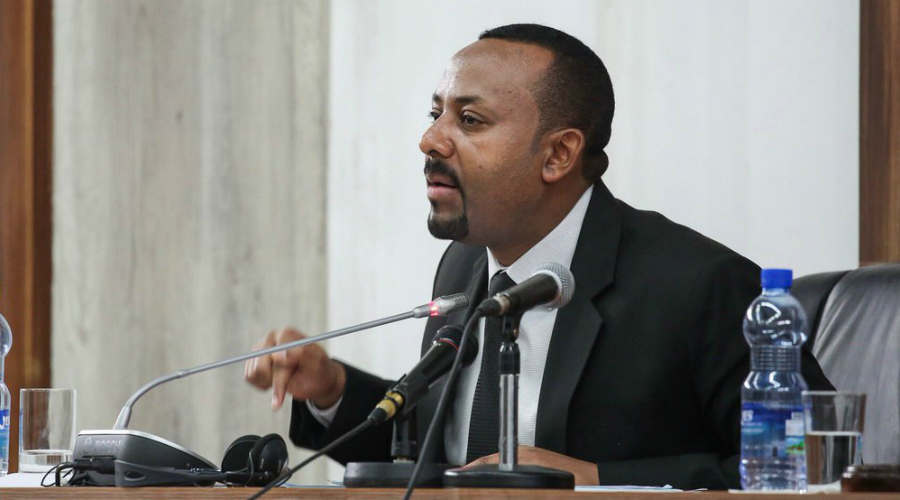Can Abiy Keep Reforming?
Editor’s Note: Ethiopia seemed on the path to reform, but a series of assassinations has rocked the country. Yale's Hilary Matfess warns that the violence may derail the positive changes being made under the leadership of Prime Minister Abiy Ahmed, who is responding to the killings with a tough crackdown. The situation calls for the international community to focus more on Ethiopia and push for it to continue liberalizing reforms.
Daniel Byman
***

Editor’s Note: Ethiopia seemed on the path to reform, but a series of assassinations has rocked the country. Yale's Hilary Matfess warns that the violence may derail the positive changes being made under the leadership of Prime Minister Abiy Ahmed, who is responding to the killings with a tough crackdown. The situation calls for the international community to focus more on Ethiopia and push for it to continue liberalizing reforms.
Daniel Byman
***
In April 2018, Abiy Ahmed emerged the unlikely winner of an intraparty horse race to replace Hailemariam Desalegn, who had resigned from his position as Ethiopia’s prime minister. Abiy is a former intelligence officer and a member of the Oromo Democratic Party (ODP), which represents the largest ethnic group, the Oromo, in the hegemonic governing coalition, the Ethiopian People’s Revolutionary Democratic Front (EPRDF). He was hailed as a reformer after his selection. Not only did he undertake a number of visible reforms—including the introduction of a 50-percent female cabinet and the release and extension of amnesty to a number of political prisoners detained under previous prime ministers—but he also began the process of reviewing and reforming some of the country’s most draconian laws and liberalizing the country’s economy through privatization of some state-owned companies. However, the government’s response to a series of assassinations of high-ranking officials in June suggests that this reform campaign, which Abiy has referred to as “medemer” (a term meaning “synergic unity”), may be tabled in favor of a return to the tactics used by previous EPRDF administrations—particularly the use of mass detentions and telecommunications censorship.
A Series of Assassinations
Rumors and conspiracy theories about the events in Bahir Dar and Addis Ababa abound; the government has described the events as a “coup attempt,” but it is currently unclear whether the incidents themselves are connected. What is clear is that on Saturday June 22, Ambachew Mekonnen, the president of Amhara Region (one of nine regional states in Ethiopia), and two other high-ranking regional officials (Migbaru Kebede and Ezez Wasse) were killed in Bahir Dar, the capital of Amhara State.
The man believed to be behind the plot, former Gen. Asaminew Tsige, had previously been imprisoned for planning a coup against the federal government. Asaminew was released recently as part of a reform initiated under Abiy’s predecessor and was working in the Amhara regional government as the region’s head of security. Though the assassinations were shocking, there is frustration that Asaminew had not been reined in sooner. According to the BBC, Asaminew “had a reputation for hardline ethnic nationalism and had previously called for the Amhara people to have greater autonomy,” including a call earlier this month on social media in which he “openly advised the Amhara to arm themselves.” He was killed when he resisted arrest.
The same day as the violence in Amhara, the Ethiopian chief of staff of the Defense Force, Gen. Seare Mekonnen, was killed by his bodyguard in his home in the country’s capital, Addis Ababa, along with retired general Gezai Abera.
Abiy’s Hardline Response
The government’s response to the crisis was swift—and resembled the ways in which previous administrations responded to unrest. These events call into question the viability of Abiy’s reform pledge.
When Abiy took to television to respond to the assassinations, he wore his military uniform, an uncharacteristic choice. Furthermore, his tone in an address to Parliament in the weeks following the assassinations was noticeably more strident than usual; Abiy told parliamentarians on July 1, “[I]f there is anyone coming for the sovereignty of Ethiopia we are ready to fight, not with a pen, but with a Kalashnikov.” The shift in rhetoric was accompanied by a series of harsh policy responses.
The government also shut down telecommunications in the country—including imposing an internet blackout that reportedly cost $4.5 million a day for four days before limited connectivity returned in Addis Ababa. Internet censorship and blackouts were used under the previous administration, particularly in response to mass protests in Oromia (demonstrations that were so disruptive that they prompted the declaration of a state of emergency and to which some have attributed Abiy’s rise). This control over and manipulation of telecommunications undermines Abiy’s stated commitment to partially privatize Ethio-Telecom and may limit the interest of multinational corporations that Ethiopia is trying to attract to serve as minority stakeholders in Ethio-Telecom. It is also a profound repudiation of the government’s anti-censorship reforms last year that lifted blocks on 200 websites. Alp Toker, the director of Netblocks, summed up the situation to Al Jazeera, saying, “On 22 June 2018, his government declared free expression a foundational right and ordered the unblocking of over 200 websites. Instead, exactly one year later, the entire internet has been blocked and Ethiopia is digitally isolated from the world.”
In addition to the communications crackdown, the government detained hundreds of people in Bahir Dar and Addis Ababa. Leaders of the Amharan nationalist group National Movement of Amhara (NaMA) were among those detained, despite the fact that Asaminew was a member of the EPRDF affiliate party, the Amhara Democratic Party. The most recent reports suggest that more than 400 residents of Amhara have been detained, in addition to significant numbers of people being detained in other parts of the country. The government is seeking to charge at least six of those detained with terrorism; the charges against many of the others detained remain unclear. A lawyer representing four of those the government intends to charge reported that they are being kept in “inhuman” conditions, “isolated in [a] 2x2 prison cell, which is cold and dark,” unable to receive visiting family, and given access to the bathroom only once a day.
The sweeping arrests harken back to previous administrations, which detained thousands of people in response to unrest and political dissent, prosecuting some under the country’s Anti-Terrorism Proclamation (ATP). The ATP gave the government sweeping authorities and was used to crack down on political dissidents and journalists. An effort to reform the ATP initiated by Abiy had been making its way through Parliament before the attacks. It is unclear now whether the Ethiopian government will be willing to cede the authority granted to it by the ATP.
Conclusions
As I have argued previously, though Abiy’s political rise is encouraging, he remains constrained by a political coalition that may be unwilling to make radical changes quickly and who may see Abiy’s reform program as counter to their interests. While Abiy and his allies may remain committed to reform, these assassinations may make it harder for him to galvanize support within the EPRDF for continued reform.
To suggest that recent events may imperil future reform is not to detract from the change Abiy has brought already. Abiy’s reform efforts to date have resulted in better female representation in government, peace with Eritrea, passage of a more liberalized Charities and Societies Ordinance in Parliament, and a more credible elections board. But the Ethiopian government’s return to its previous tactics to respond to internal insecurity has implications for the country’s democratic trajectory—particularly for the country’s ability to hold free and fair elections in 2020. Democratic backsliding in the face of internal security challenges threatens to undermine Abiy’s “medemer” reforms and Ethiopia’s long democratic transition.
The events of June 22 may be an inflection point for Ethiopian politics. The international community can encourage continued liberalization and democratization in Ethiopia by supporting the development of an independent commission to investigate the events in Addis Ababa and Bahir Dar. The violence has fanned ethno-regional tensions, which could manifest in communal violence if not assuaged by a transparent investigation and report concerning the assassinations.
Additionally, the international community can support the National Elections Board to ensure that preparations for the 2020 elections are progressing according to schedule. Just prior to the assassinations, Birtukan Mideksa, the head of the board, lamented that insecurity related to ethnic violence could force an election delay. “If the security of the country is not going to improve, we can’t tell voters to go and vote,” she told Reuters. Opposition party members and members of the EPRDF coalition both asserted that, were the elections to be delayed, the incumbent government would be “illegitimate.” International support to ensure that Ethiopia is stable enough and equipped to hold free and fair elections in 2020 could facilitate the memorialization of the June 22 assassinations as a tragic aberration in the path toward democratization, rather than as a rallying point for violent ethno-nationalist sentiment.





